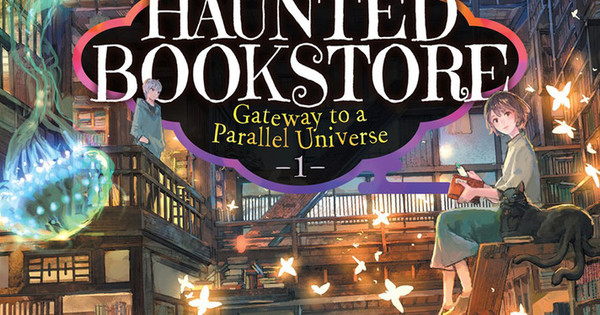The Haunted Bookstore – Gateway to a Parallel Universe Novel 1: The Spirit Daughter and the Exorcist Boy

The Haunted Bookstore – Gateway to a Parallel Universe sounds on paper like several kinds of catnip. It features a magical book rental shop that carries titles long-lost to the human world, a young human woman raised by the shop’s ayakashi owner, and a cast of characters straight out of something by Shigeru Mizuki. In fact, there are elements of the story that feel very similar to the 2018 GeGeGe no Kitarō anime in terms of how the supernatural and the human characters relate to each other. But despite all of these winning elements, the book takes a bit too long to get off the ground, and while it does improve as it goes on, it also drags more than it should, making it that most disappointing of reads: one that fails to live up to its abundant potential.
The narrator for most of the book is Kaori, a twenty-year-old woman who has been living in the spirit world since she somehow wandered in as a toddler. Although the supernatural denizens of that realm do enjoy the taste of human flesh, they’re by no means required to eat it, and Kaori, instead of being someone’s snack, is instead adopted by the man who runs a book rental shop. Although she did go to the human world for school (with the implication that she lived at school during high school), Kaori mostly spends her time helping her father at the store as well as the woman who runs the local apothecary with her business. Although they don’t live together, the apothecary is Kaori’s de facto mother, and she’s never felt like she lacked friends or family just because most of the people she associates with aren’t human.
That “most” is because of a high school boy who appears in the spirit realm one day. His name is Suimei, and he seems to have come deliberately, despite a family history of work as an exorcist. Since Suimei arrives unconscious, Kaori and her dad take him in, both worried about his health and that as an unattached, unconscious human someone might decide he’s safe to eat. Suimei is less than thrilled when he wakes up, but he also has no intention of returning to the human world until he fulfills his mission: finding his friend who has disappeared. None of the spirits seem to care that he’s an exorcist (a bit of a blow to his ego), and Kaori takes it upon herself to educate him about how spirits are people too, somewhat to his dismay.
While this could be interesting enough on its own, it sadly doesn’t quite work out that way. In part this may be because, while Kaori is unobjectionable as a character and a narrator, experiencing the story mostly through her first-person voice means that we have very little grasp of Suimei’s thoughts and situation. It is a good study in how Kaori makes a lot of assumptions and just bulldozes ahead, but until the interlude chapter (possibly so called because we switch to Suimei’s narration; it otherwise is clearly part of the chronological story) everything feels a little flimsy in the plot department. It isn’t until we meet two cicada spirits and learn about Kaori’s history with them that the story takes on any sort of emotional depth, and while it’s good that it eventually does, it also can be a bit of a slog to reach that point.
Once we do, the book improves fairly dramatically, only to stumble in the final stretch by having us miss the entirety of a major boss battle because Kaori is told to stay safe in the spirit realm while Suimei and her dad go off to fight it in the human world. This could have easily been avoided by switching narrators again, but for whatever reason Shinobumaru opts not to do this. The result is an ending that feels more rushed than it ought to, although the epilogue does help to make up for that by relying on a much softer mood. There’s certainly ample evidence that the author is a capable one; it’s more that the book reads like the work of someone who hasn’t yet hit their stride and will become a better writer later on in their career.
In terms of world-building and inspiration, there are a lot of very interesting elements at play. Shinobumaru freely admits to being a fan of folklore and being inspired by Shigeru Mizuki, so the parallels to his work are very likely intentional. Other bits and pieces are creative in the best way. For example, since the various hells of Japanese mythology are more closely tied to the human world than the spirit realm, a way to get to far-flung regions of Japan is to simply take a shortcut through hell, which is kind of like the spirit world’s basement. It’s still a terrifying place and is taken directly from the Hell Scrolls, but the adults explained to Kaori that souls trapped there were getting a chance to make up for their sins, so really, it was just a temporary stay there and she shouldn’t try to help them or feel badly for them. (Suimei, not being five when he first sees it, is harder to convince.) There’s also a seamless use of actual folktales in several of Kaori’s adventures with spirits, with the Daidarabochi chapter being a particularly good example.
By all rights, The Haunted Bookstore should have read like a combination of GeGeGe no Kitarō and Kakuriyo: Bed & Breakfast for Spirits. And it does feel like it can eventually get there. But this volume has a real author-in-progress sensibility to it and doesn’t quite manage to capitalize on its plot and world. Those, however, are good enough that it’s probably worth giving this series a second book.

0 comments: